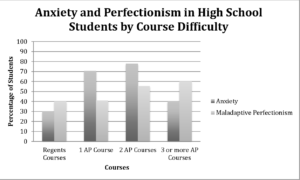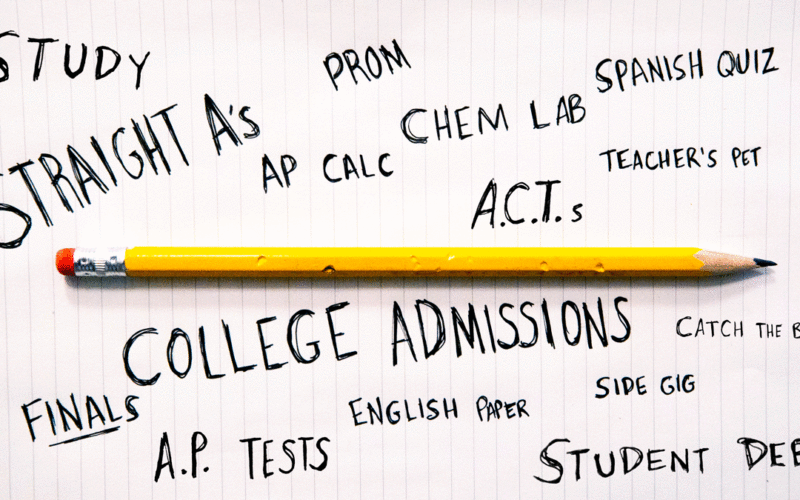By Sydney Knisely
Are schools destroying their brightest students without even knowing? Many schools push for students to take AP classes; when students sign up they are signing up for an extra level of stress and anxiety. Many studies have shown that while advanced classes can help your GPA and college credit they do have negative ways on your mental health. So, are AP classes worth the struggle?
 AP and CCP classes can help give you college credits and bring your skills in Math and English to a new level. But extra work and stress come with it. Many studies have shown that the growth of students entering college classes also correlates with a raise in stress, anxiety, and maladaptive perfectionism levels. Students who take more advanced classes (3+) are proven to have less of an anxiety level. but more of a maladaptive perfection level; where your perfection levels can cause anxiety, OCD, ADHD, depression, and low self-esteem, and those can affect your everyday life in terrible ways.
AP and CCP classes can help give you college credits and bring your skills in Math and English to a new level. But extra work and stress come with it. Many studies have shown that the growth of students entering college classes also correlates with a raise in stress, anxiety, and maladaptive perfectionism levels. Students who take more advanced classes (3+) are proven to have less of an anxiety level. but more of a maladaptive perfection level; where your perfection levels can cause anxiety, OCD, ADHD, depression, and low self-esteem, and those can affect your everyday life in terrible ways.
The Student Perspective
Students have shown more anxiety in AP classes. I’ve asked two students some questions to get their opinion, a sophomore who takes the college classes offered here in Federal Hocking and a high school junior that goes to the college campus (Ohio University). I asked both about the classes they are taking and how they could affect them. I interviewed Abby Householder, an FHHS junior and full-time student at OU, who said, “There’s more stress with college classes than high school classes. At least in the sense that the deadlines are way more strict. Lots of classes will have hard deadlines, and anything turned in after that is counted as a zero (unless you have a really good reason).” I asked about her feelings about taking college classes at a young age, she replied with:
“I love advanced classes. They have their pros and cons, and that list is different for every person. For me, the pros far outweigh the cons (and any stress). This opportunity lets me get years of college done for free, allows me to take classes that engage me more, and gives me a more flexible schedule to work with. I’m happier now that I’m doing these classes. I get along better with classmates, and school feels more like an anchor again, instead of something to worry about.”
Interviewing Abby and just knowing her as a friend, you can tell that she is very passionate about the college classes and enjoys them. Abby is a great example of how college classes can be really good for someone and help them grow as a student and bring out the best in her. Abby explains perfectly the pros and cons of the college program.
Sophomore Savannah Johnson takes college English in school. I was able to sit down with her and get her opinion on what college classes within the school are like. We discussed the stress that could come with someone choosing an English college class.
“Definitely. There is a lot more work to contend with. work slowly, take a break and work in segments to help and reduce the stress. But the most important thing to think about is to take the advanced classes if you are sure they will help you and you’re mentally prepared for them because they come with a lot of stress” After talking with both of them a lot of things have been revealed, college classes are harder and come with more stress but they both seem to be worth it. You get free college, to pick more topics that are in your interest and be engaged, and enjoy the class you’re taking.
A Teacher Perspective
Another part of college classes is the teachers themselves. They witness all sorts of kids enter their classes to learn more. They can see in the kid’s behavior in class and the work that’s being turned in how well a kid is doing in class and how the stress of the class can affect them. I Interviewed the CCP math teacher, Mrs.Roberts, on the stress level in her college classes and how they can have negative and positive outcomes on the kids. While talking to her we talked about how the class can bring out a more social side to kids and help them mature in a way and grow as a person. While sharing opinions back and forth she gave a general statement; “the main thing is don’t expect to make straight A’s, don’t be hard on yourself if you don’t make an A. It’s a hard class and you don’t have to be hard on yourself all the time and stress. If you can’t make the A go for what you can reach.” This brings up a good topic on how kids will push themselves to failure and want to be so perfect that they keep climbing up until they fall, instead of finding that sweet spot where they are still working hard but can spend time on themselves.
In Conclusion
College classes are rough on anyone who takes them. Especially high school students who are trying to balance high school life, college classes, sports, clubs and still have a childhood at the same time. And they can put a dent in your mental health and at the end of the day, you and your mental health should go in front of everything else. You might be ahead of the game but you won’t be happy, and without being happy you can’t live life the way you want and should live it. College classes being offered to kids can be beneficial but the classes should not be forced, pushed onto, and make kids feel they have to take them to achieve in life.




